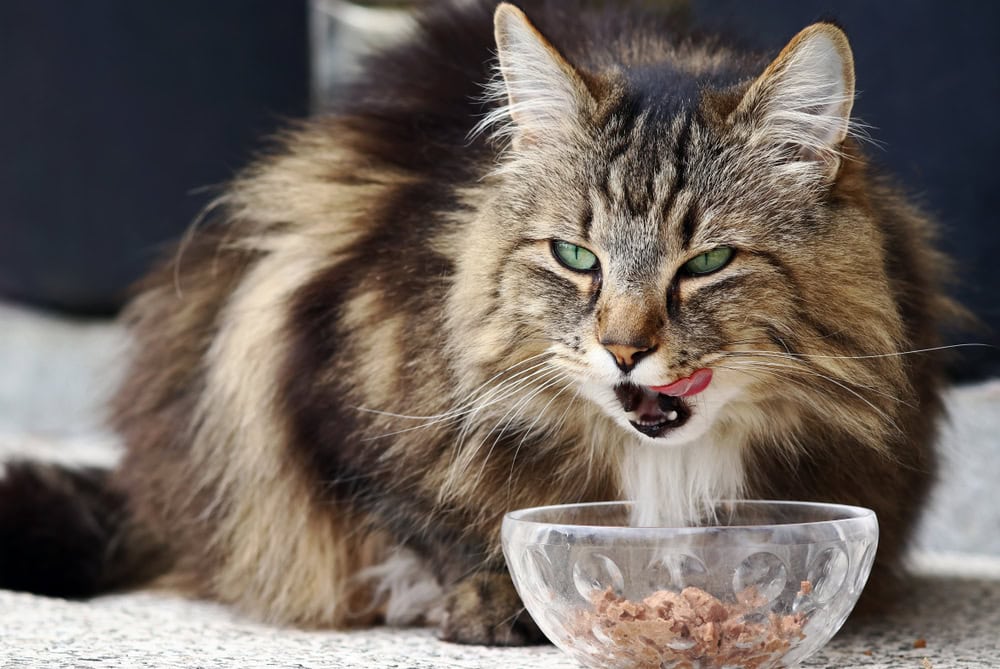Can Savannah Cats Swim? Do They Like Water? Breed Preferences & Characteristics

Updated on
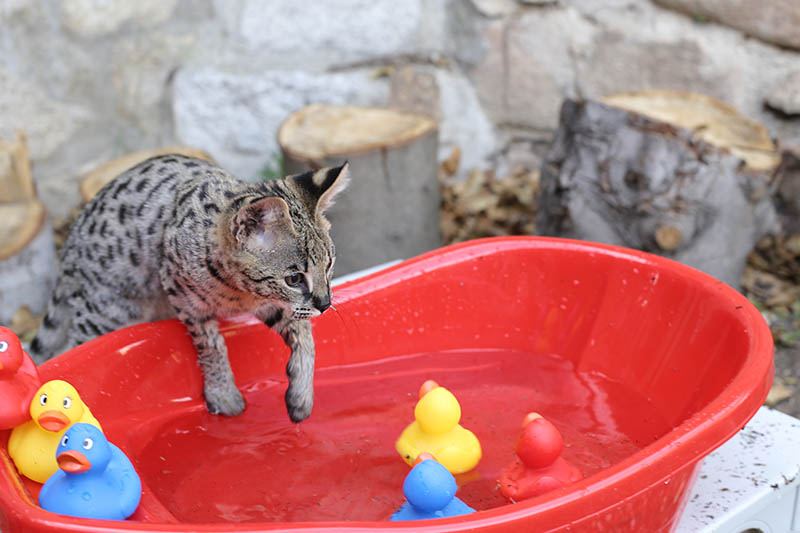
Savannah cats are a unique cat breed that are a cross between a serval and a domestic cat. They have a wild, exotic look and an endearing, outgoing personality that makes them a popular choice for pet owners. What many people don’t know, however, is that Savannah cats seem to have a special relationship with water, and they wonder if these cats actually like to swim.
It turns out that Savannah cats are surprisingly good swimmers and love to play in the water. They have a natural affinity for water, which is likely due to their wild cat ancestor, the serval. That being stated, it’s not advisable to just toss your cat in the water. Training and a relaxed introduction are the best ways to get your cat used to the water for the first few times. After that, you can find several water activities that they will love. From kiddy pools to bath time, you will find that your Savannah cat will be more than happy to join in on the fun.
Why Do Savannah Cats Like to Swim?
While the exact reason behind it is unknown, Savannah cats have an inherent affinity towards water and like to play in it. This may be due to their wild ancestor, the African serval. The serval is known as a “swimming cat” and has been observed swimming across rivers in the wild. Savannah cats have a similar affinity for water and enjoy swimming.
A study conducted by the Human-Animal Interaction Research Group at the University of Lincoln found that the Savannah breed loves water and also found that they enjoy playing in water and even prefer drinking water from a bowl over a water fountain. They also prefer water toys over catnip toys, believe it or not.
While the exact reason behind it is unknown, one theory is that the wild serval ancestors of the Savannah cat would have drunk from small pools of water in the wild. Because of this, drinking water from a bowl might be more natural for the Savannah cat than drinking from a water fountain.

How to Introduce Your Savannah Cat to Water
The best way to introduce your Savannah cat to water is to start when they are kittens. Start off with small bowls of water (or in a sink) and give them toys that float in water. This will show them that water is something that’s safe and enjoyable. As they grow, you can provide them with larger toys and more water-friendly items, and even a kiddie pool for them to swim in.
You can also put out a large water bowl for them to drink from. Make sure it’s big enough for them to drink from, but not big enough for them to fall in.
If you want to take it a step further, you can purchase a water fountain for them. While it doesn’t sound like something a cat would enjoy, Savannah cats actually love water fountains. They’re a great way to keep water fresh and are extremely fun for your Savannah cat to play with.
Frequently Asked Questions About Savannah Cats
What makes Savannah cats different from other cat breeds?
The Savannah cat is a hybrid breed that is made by breeding a domestic cat with a serval. The serval is a wild African cat that can grow up to 3 feet long and weigh up to 20 pounds. This breed is extremely intelligent, friendly, and loves to interact with people. Savannah cats actually look like miniature leopards, as a result of their orange, black-spotted coats and long tails.
They have a wild look and behave like wild cats, but they’re domestic. They’re not as large as a serval, but they are much larger than a domestic cat. These beautiful cats are active, excitable, and need plenty of attention and interaction. They’re very social and love people. They are also friendly and affectionate toward other animals.
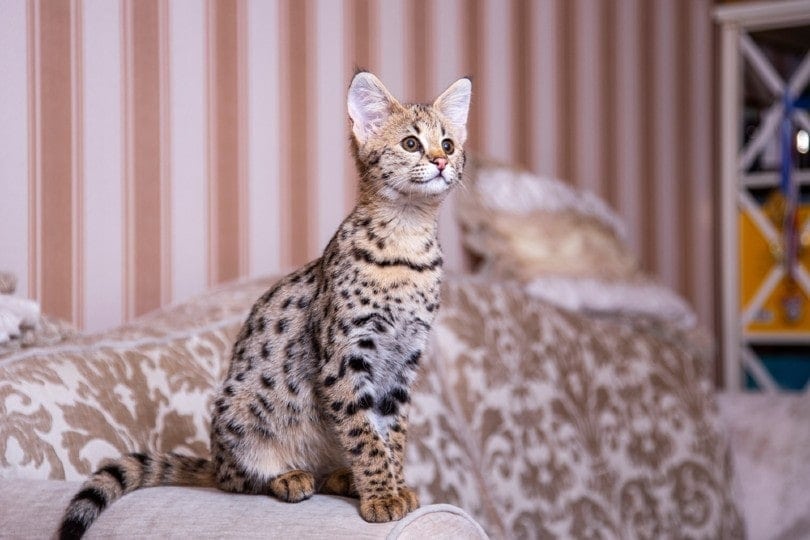
Where did the Savannah cat breed originate?
The first Savannah cat was produced in 1986 when a domestic cat was bred with a male serval. Many people wanted the unique look of a serval cat without the hassle of dealing with a wild animal. The Savannah cat was created as a hybrid with the desire to keep the good traits of both the serval and the domestic cat.
The first generation of Savannah cats were used to breed the next generation, but soon people realized that the hybrid offspring were healthier than the first generation. Breeders soon switched to using second and third-generation Savannah cats. The International Cat Association recognized the Savannah breed in 2002. And since then, the Savannah breed has become incredibly popular and continues to grow in popularity.
Why do Savannah cats cost so much?
It’s no secret that these cats cost quite a bit of money. In fact, you can expect to pay anywhere from $1,000 to $15,000 for a Savannah kitten. The reason is that substantial financial investment is required to establish a successful Savannah breeding program. To give their kittens the best start in life, breeders often prefer to feed them raw meat or premium foods, not to mention the testing and vet care that they’ll require during this process.
Do Savannah cats get along with other pets and children?
For the most part, yes. However, every cat is different. Savannahs are naturally friendly and affectionate and after the initial getting-to-know-you phase, you can expect them to be able to get along with other pets. They’re also pretty good with children and tend to be really affectionate cats that love to cuddle.
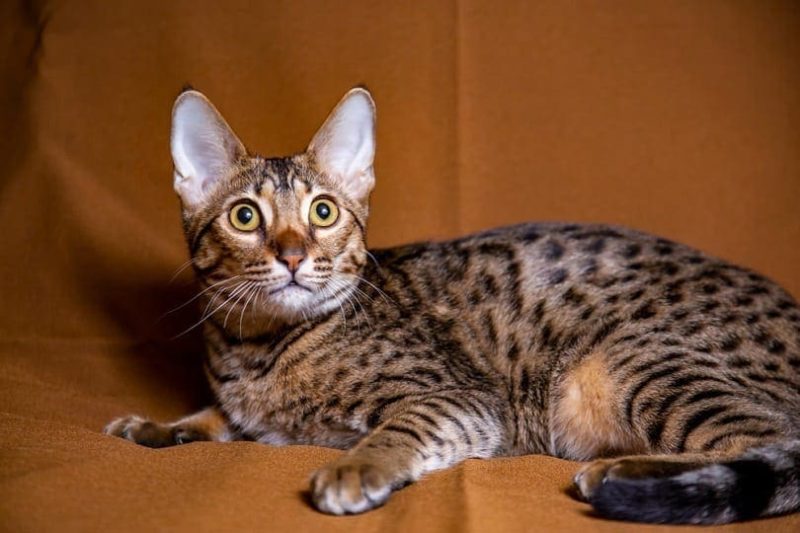
Is it possible to train Savannahs?
Savannahs can be trained to respond to certain obedience commands and perform some tricks, but it’s important to note that they aren’t as adaptable as dogs. They’re fairly intelligent and easy to train, so simple commands will be accepted by them. Leash training is a common method of training these cats and they love to play fetch. Many will also recognize their names and respond when they’re called.
Will a Savannah cat use a litter box?
Yes, it will. Most kittens are good with litter box habits. Mother cats teach their kittens good hygiene habits when they’re young and many breeders use litter boxes at their locations. Your kittens should be litter-trained before they arrive at your home. However, you can always train your cat to use the litter box once you bring it home. It may take a few weeks of trial and error, but patience is key.
Are Savannah cats aggressive toward other pets?
No. The Savannah cat isn’t known for being aggressive or destructive in households. Savannah cats are intelligent and high-energy, and they do require stimulation, exercise, and routines that keep them busy. If you’re away from work every day, be sure to have something for them to do or you may find them literally climbing the walls when you get home. Toys like scratching posts, squeaky toys, balls, and other agility devices can help them burn off their energy.
Are Savannah cats hypoallergenic?
No, these cats are not hypoallergenic. They will need to be groomed regularly to reduce the amount of dander, something that can trigger reactions in people with cat allergies.
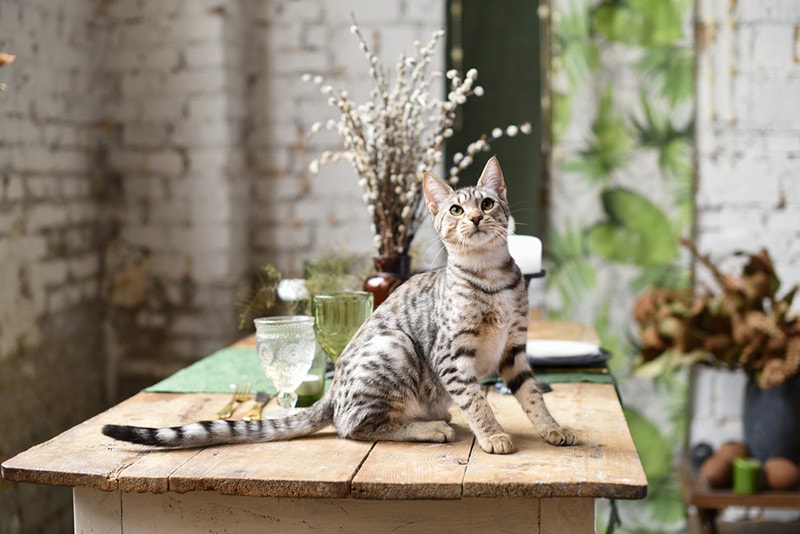
Are Savannah cats required to be immunized like other cats?
Yes, they are. Their kittens must have their first veterinary appointment and be given a set of vaccines between around 8-9 weeks old. Reputable breeders will give the kitten two vaccines before they send it home. Individual states and municipalities may have different rabies vaccination schedules. The owner is responsible for ensuring that the regulations are adhered to once the kitten arrives home.
Is there a waiting list or Savannahs?
There can be depending on the breeder. These kittens are highly sought after and to get a new kitten, you may need to wait for a new litter to be born. The number of kittens that are available to purchase annually is therefore very small. You may need to sign up for a waiting list or contact multiple breeders in order to find a kitten. Note that to add your name to their waiting lists, many breeders require a deposit (anywhere from $200 to $500 or more). You may have to wait for a kitten to become available for up to 12 months. Sometimes, waiting lists can be long so you might decide you don’t have the time to wait and buy a kitten from another breeder.
What food do Savannah cats like to eat?
These cats eat pretty much the same food as other cat breeds. When purchasing your kitten, your breeder should give you a list of recommended foods, both kibble and raw. They can eat premium cat food to maintain their best health. Do not change your cat’s diet without consulting your breeder. This is especially important for kittens that may not tolerate different flavors of the same food.
Do I need to worm my kitten?
Before your kitten arrives at your home, they should be tested for parasites and wormed. Your yearly wellness check should include worming if your kitten has not been outside. Flea and worm medication should be given to Savannahs who have access to the outdoors or are close to other animals. Talk to your veterinarian about deworming.
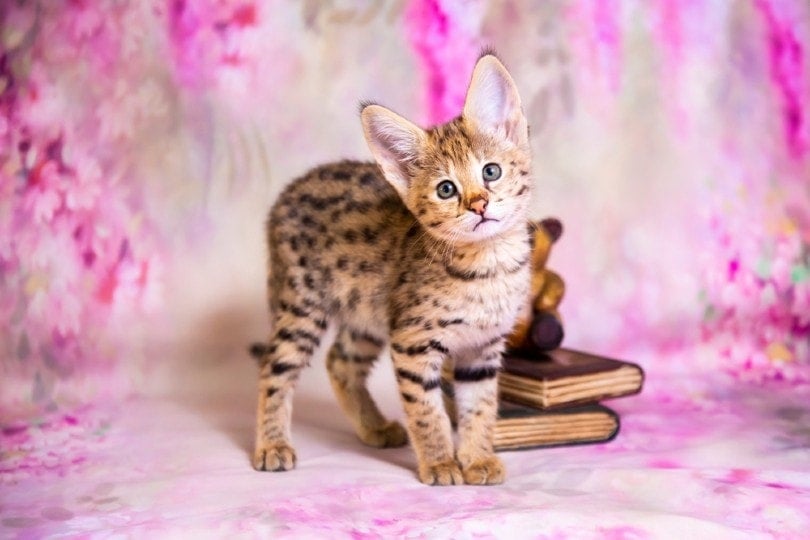
Do Savannah cats have any breed-specific health problems?
Two hereditary diseases are common in Savannah cats and these diseases can be tested genetically. These diseases include Pyruvate Kinase Deficit and Progressive Retinal Atrophy. Reputable breeders are able to test for these diseases and take out any animals that may be carrying the disease from their breeding programs. So be sure to ask your breeder to provide proof of testing.
Should Savannah cats be allowed outdoors?
You may be surprised by this, but no. Savannah cats shouldn’t be allowed to roam outside without an owner and leash. These cats are very curious and are at high risk of car accidents. They’re also prone to wander off and never return, putting them at risk of injury or being mistaken for a wild cat by humans. These cats are also at risk of being stolen by admirers. So no, never allow your Savannah cat to go outdoors without you and a good leash.
Can Savannahs climb fences?
Yes, like many cat breeds, they can climb most fences fairly easily. They should only be allowed to go outside in an enclosure with a secure top. You can also use a leash with a secure harness or walking jacket.
Is there any way to stop my Savannah from scratching up my furniture?
Savannahs, like all cats, have a natural instinct to scratch on things. It’s a way for them to mark their territory with their scent glands and it helps them sharpen their paws. One of the best things that you can do to get your cat to stop scratching up all of your furniture is to simply give them some activities to do when you’re at home and when you are away. A scratching post, scratch toy, or cat tree is one of the best and easiest ways to stop annoying furniture scratching. You can also create mazes, climbing posts, and other agility toys and devices in your home to help your cat burn off their energy.
Summary
So, as you can see, if you bring a Savannah cat to your home, you shouldn’t be surprised that it has a fondness for water. However, it’s best not to ever leave your cat alone in the water and to introduce it to it slowly. These cats are great swimmers but young cats or ones unfamiliar with water will definitely need a bit of training and support initially. It’s also a good idea to know other aspects of a Savannah cat before bringing one home, and hopefully this article provided all of the information you need to know.
Featured Image Credit: AJR_photo, Shutterstock




